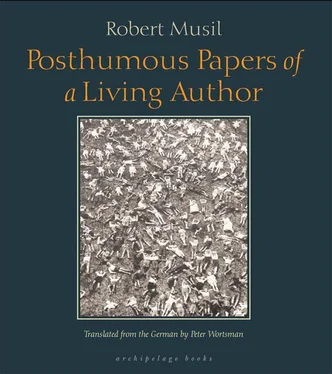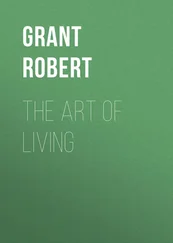Here we may add the second observation, that all such judgments derive from diverse circles hermetically closed off to each other. They are formed by related publishers, authors, critics, newspapers, readers, and miscellaneous successes, each of whom does not have contact with anyone outside his particular circle; and all of these large and small circles, whose cohesiveness may well be compared to that of a romantic entanglement or a political party, have their own geniuses or at least their “No-one-else more worthy of the title.” True, a circle is formed of the most successful people from different circles, but we should not be deceived by this; it would appear as if the truly significant would not after all go unnoticed, and that a nation were eagerly waiting to take such significance in, but in reality, the all-around success is the progeny of a rather discordant set of parents; for what is admired is not so much that which has something to say to everyone, but rather that which leaves each his own. And just as fame is a mixed bag, so too are the famous a motley crew.
If we do not limit ourselves to the realm of belle lettres, their image as a group is overwhelming. For the circle, the ring of people, the school, or the widespread success that emanates from anyone involved in an intellectual activity is negligible compared to the plenitude of sects whose souls are nourished on eating cherries, on the theater of the great outdoors, on musical gymnastics, on Eubiotics, or any one of a thousand other oddities. It is impossible to say how many such Romes there are, each of which has its own Pope, whose name the uninitiated have never heard, whose followers, however, look to him for the salvation of mankind. All of Germany is teeming with such spiritual brotherhoods: and from this great Germany, in which famous scientists can live only by their teaching and select poets at best by marketing journalistic bagatelles, from this same Germany, innumerable lunatics are swarmed with the means and participants for the development of their whims, for the printing of their books and for the founding of their periodicals. For that reason, before bad times recently set in in Germany, more than a thousand magazines were founded annually and more than thirty thousand books appeared, and this was deemed the sign of a towering intellectual achievement.
It is unfortunately to be assumed with infinitely greater certainty that this will rather turn out to have been a sign, not recognized early enough, of the spread of a dangerous group-mania. Infected by this mania, thousands of little groups each peddle their own set notion of life, so that it ought not to surprise us if soon a genuine paranoiac will hardly still be able to resist competing with the amateurs.
Art Anniversary
“It is easier to predict what the world will be doing a hundred years from now than to predict how it will write in a hundred years. Why? The entire answer isn’t fit for a dinner table conversation.” (From an unfinished book that will offer a more serious answer to the question.)
If, as is the case from time to time, you happen to reencounter a play or a novel which twenty years ago grabbed hold of your soul, along with the souls of many others, you experience something which has actually never been explained, since apparently everyone takes it for granted: the sparkle is gone, the importance has disappeared, dust and moths fly off at your touch. But why this aging must take place, and what exactly is altered in the process, this no one knows. The comedy of all art anniversaries consists of the old admirers making solemn, uneasy faces, as if their collar-button had slipped down behind their shirt front.
It is not the same as reencountering a flame of your youth who has not grown any prettier over the years. For in the latter case you no longer even comprehend what once made you stutter, although at least it has something to do with the touching transitory nature of all earthly pursuits and the notoriously fickle nature of love. But a work of literature that you reencounter is like an old sweetheart who for twenty years has been embalmed in alcohol: not a hair is different, and not a fleck of her rosy epidermis has changed. A shiver rolls down your spine! Now you are supposed to be once again who you were: one semblance demands another. It is a stretching torture, in the course of which the soles have remained in place, but the rest of the body has been twisted a thousand times around the revolving world!
Reliving a former art experience is also different from meeting the other ghosts of old arousals and infatuations: enemies, friends, wild nights, passions endured and surmounted. All this and the conditions that surround it sink into oblivion as soon as the fling is over: It has fulfilled some purpose and was absorbed by the fulfillment; it was a denial in one’s life or a stage in the development of your personality. But bygone art served nothing; its former effect has disappeared unnoticed, lost itself along the way; it is a stage for no one. For do you really feel yourself to be standing on a higher plateau when looking down upon a once-admired work? You stand no higher, just elsewhere! Indeed, to tell the truth, even if, while standing before an old painting, you realize with a comfortable, hardly suppressed yawn that you no longer need be enthusiastic about it, you are still far from being enthused by the fact that there are new paintings to be admired. You simply feel yourself to have slipped from one timely compulsion to another, which by no means excludes the fact that you went about it perfectly voluntarily and actively; voluntary and involuntary behavior are not after all direct opposites, they also blend in equal parts, so that ultimately, you involuntarily overindulge in voluntary behavior, or voluntarily the involuntary, as is often the case in life.
Still, in this elsewhere you will find a remarkable dose of transcendence. It is, we realize, if appearances do not deceive, related to fashion. Fashion, after all, is not only marked by the one characteristic, namely that you find it ridiculous in retrospect, but also by the other, that as long as a fashion lasts, you can hardly imagine taking seriously the opinions of a man who is not dressed from head to toe just as ridiculously as you yourself are. I would not know what in our admiration of antiquity could shield a budding philosopher from suicide, if not the fact that Plato and Aristotle wore no pants; pants have contributed far more than you might think to the intellectual development of Europe, for without them, Europeans would most likely never have gotten over their classical-humanistic inferiority complex vis-à-vis the antique. Thus we hold our time’s most profound feeling — that we would not barter with anyone who wasn’t dressed in contemporary clothing. And even of art we only feel for that same reason a sense of progress with each new year; although it may simply be a coincidence that art exhibits, like the latest fashion, appear in the spring and fall. This sense of progress is not pleasant. It reminds you, in the most extreme way, of a dream in which you are seated on a horse and cannot get off, because the horse never stands still. You would gladly take pleasure in progress, if only it took a pause. If only we could stop for a moment on our high horse, look back, and say to the past: Look where I am now! But already the uncanny process continues, and after experiencing it several times, you begin to feel queasy in the stomach with those four strange legs trotting beneath you, constantly carrying you forward.
But what conclusions may we draw from the fact that it is just as ridiculously unpleasant to look at old fashions (so long as they have not yet become costumes), as it is ridiculously unpleasant to look at old pictures, or the outmoded façades of old-style houses, and to read yesterday’s books? Clearly, there is no other conclusion except that we become unpleasant to ourselves the moment we gain some distance from what we were. This stretch of self-loathing begins several years before now and ends approximately with our grandparents, that is, the time to which we begin to be indifferent. It is only then that what was is no longer outdated, but begins to be old; it is our past, and no longer that which passed away from us. But what we ourselves did and were lies almost completely in the realm of self-loathing. It would indeed be intolerable to be reminded of everything that we once considered most important, and the great majority of people would remain surprisingly little moved if, at an advanced age, you were to show them again, in the form of a movie, their grandest gestures and once most stirring scenes.
Читать дальше











